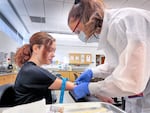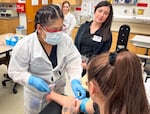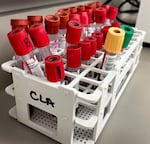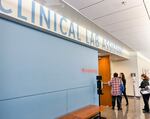
Phlebotomy student Sierra Schultz (right) practices drawing blood on her classmate Grace Jonsrud. “The fact that this is a short term certificate program, it gives me more motivation to show up and actually get into something I know is going to be my career,” said Schultz.
Tiffany Camhi / OPB
At Clackamas Community College’s Milwaukie campus, phlebotomy student Grace Jonsrud is going through the motions of drawing blood from a patient. Even though she’s in a classroom setting, Jonsrud, 20, still wears scrubs with a white lab coat, surgical mask and goggles. After pulling on a pair of blue sterile gloves she walks through the blood drawing process with her patient, one of her classmates.
“I’m gonna tie the tourniquet and make sure it’s nice and tight,” Jonsrud tells her classmate. “I am feeling for the median vein, here in the middle of the arm.”
Jonsrud grabs a needle, pops open a tube to gather the blood sample and begins the draw.
Four months ago, getting a job in the health care field seemed out of reach to Jonsrud.
“I had always known that I wanted to do health care in some capacity,” said Jonsrud. “But I never felt like I could afford the schooling and the eight year school thing. I couldn’t do that.”
But a career adviser at CCC convinced her to try out a new and shorter program to become a phlebotomist — a health care professional trained to collect blood samples — through a pilot program the college started in September.
The phlebotomy program is part of an effort to create quicker avenues into jobs that are in demand in the Portland region. Some take just six months to complete. And many, like phlebotomy, are distillations of degrees the school already offers. School administrators say the six-month certificates come in response to both workforce and student needs.
“When I found out that it would be a six-month program that definitely helped because I am approaching a point where I need to be contributing to my household a lot more and being able to get out into a good career much sooner,” said Jonsrud.

Phlebotomy student Laura Cahuich (left) preps her classmate before drawing her blood. CCC phlebotomy professor Emily Zuniga (background) supervises the students.
Tiffany Camhi / OPB
Getting students into jobs that pay a living wage is one of the goals of this new program.
According to the state employment department, phlebotomists in the Portland metro area made an annual salary close to $48,000 a year on average in 2023. That’s just above the estimated living wage for a single adult in Multnomah County, according to the Living Wage Calculator, developed by the Massachusetts Institute of Technology.
Another goal is to fill the workforce needs of the local community. Director of CCC’s Health Sciences program Virn Chambers said the Portland area health care industry has been pressuring post-secondary schools to pump out more phlebotomists for several years. Across Oregon, there are 287 job openings for phlebotomists. About half of those openings are in the tri-county area.
“The employers really wanted a short program,” Chambers said. “They want phlebotomy graduates now so they can put them in the workforce.”
The new phlebotomy program was originally a part of a yearlong clinical lab assistant program the school offered. Part of the reason Clackamas was able to winnow it down to six months was by using a corequisite model, said Chambers. This model eliminates prerequisite classes that can lengthen the amount of time a student is in school. Instead a corequisite approach allows students to enroll in college-level courses immediately while simultaneously taking remedial classes.
“We needed to teach and train the medical terminology, anatomy and physiology within the program rather than it being a prerequisite,” said Chambers.

In the program’s first term, phlebotomy students learn to draw blood in hands-on labs. The students simultaneously learn medical terminology and other health care fundamentals in online courses.
Tiffany Camhi / OPB
In addition to phlebotomy, CCC is also launching a new six-month welding certification program, another career in high demand across the state. These two programs are the latest additions to the school’s career pathways certificates, most of which take a year or less to complete.
These shorter certificate programs are not new to community colleges, said CCC Vice President of Instruction and Student Services David Plotkin. But Plotkin does think six-month certificates could become more common as employer and student needs evolve.
“We’re always looking for ways to encourage folks to get a college education that might lead them to a great entry-level job, particularly in this kind of economy,” said Plotkin.
But the school wants to do more than just fill a need in the workforce. They also want to make sure their students are getting a well-rounded education that offers not only a direct pathway to jobs but also a way to continue on to an associate degree.
“We’re looking at how we can break our two-year degrees into these stackable chunks so that it’s easier for students to access the education,” said Plotkin.

The new and shorter phlebotomy program was distilled from a longer clinical lab assistant certificate that took one year to complete.
Tiffany Camhi / OPB
Next semester, CCC’s phlebotomy students will get to put their new skills to the test at internships at Kaiser Permanente, Providence and other health care providers.
Grace Jonsrud says she is grateful for the possible career opportunities ahead and how the program has changed her sense of herself.
“As much as I wanted to get into the health care field, I did not think I would be able to and so this has really boosted my confidence in myself and my own abilities,” said Jonsrud.
Jonsrud’s classmate, 37-year-old Laura Cahuich, agreed that the program has been a big confidence booster. Cahuich said she never saw herself working in health care before this program. But now she too sees new career possibilities.
“I’m very thankful because I have found something that I truly like and I can see myself doing [phlebotomy] or, possibly, this is just my foot in the door into the medical field,” said Cahuich.
